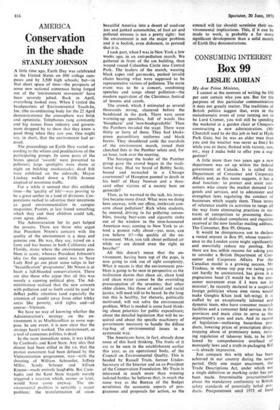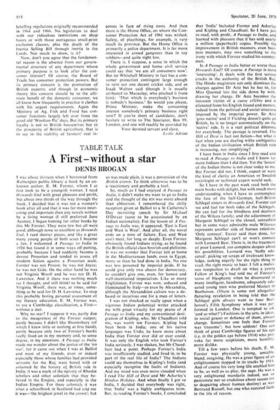CONSUMING INTEREST
Box 99
LESLIE ADRIAN
My dear Prime Minister, 1 cannot at the. moment of writing be 100 per cent certain who you are. But for the purposes of this particular communication it does not greatly matter. The traditions of British politics suggest that, even in the melodramatic event of your turning out to be Lord Cromer, you will still be spending the weekend in a garden chair at Chequers constructing a new administration. (Mr Churchill used to do this job in bed at Hyde Park Gate, but he was an older man than you and the weather was never as fine.) So while you sit there, flushed with victory, sun, etc., may I make bold to offer you a sug- gestion?
A little more than two years ago a new 'department was set up within the federal government of Canada. It is called the Department of Consumer and Corporate Affairs and, as this name suggests, it has a dual function: to protect and assist con- sumers who create the market demand for goods and services, and to administer and strengthen laws regulating the conduct of businesses which supply them. These terms of reference enable its activities to range all the way from eliminating practices in res- traint of competition to processing thou- sands of individual complaints and inquiries received at the now familiar mailing address, The Consumer, Box 99, Ottawa.
It would be disingenuous not to declare a vested interest in Box 99, whose transfer- ence to the London scene might significantly and mercifully reduce my postbag. But there are less selfish reasons for asking you to consider a British Department of Con- sumer and Corporate Affairs. For the Canadian model is a growing success. Mr Trudeau, in whose top pop PM rating you can hardly be uninterested, has given it a pugnacious head ('I would be in the con- sumer movement even if I were not its minister', he recently declared to a sceptical foreign politician whose own views would make Genghis Khan look left-wing). It is staffed by an exceptionally talented and dynamic team, who have consumer research facilities and a consumer field service in the provinces and main cities to serve as the department's eyes and ears. And its record of legislation—outlawing hazardous pro- ducts, lowering prices of prescription drugs, stopping abuse of promissory notes, revis- ing regulation of takeover bids, to be fol- lowed by comprehensive overhaul of monopoly laws and a truth-in-packaging Bill —is already impressive.
Just compare this with what has been achieved in our country during the same period. Only one major enactment, the Trade Descriptions Act, under which not a single definition or marking order has yet been made. Interminable procrastination about the mandatory conformity to British safety standards of potentially lethal pro- ducts. Postponement until 1973 of food labelling regulations originally recommended in 1964 and 1966. No legislation to deal with our ridiculous restrictions on shop hours or with those outrageous small-print exclusion clauses, plus the death of the Inertia Selling Bill through inertia in the Lords. Not much to show, is it?
Now, don't you agree that the fundamen- tal reason is the absence from our govern. mental structure of any department whose primary purpose is to look after the con- sumer interest? Of course, the Board of Trade has consumer protection powers. But its primary concern is the promotion of British exports; and though in economic theory this concern should be to the ulti- mate benefit of the domestic consumer, we all know how frequently in practice it clashes with his urgent requirements. Again the Ministry of Ag, Fish and Food has con- surlier functions largely left over from the good old 'Wootton Pie' days. But its primary loyalty is not to British housewives but to the prosperity of British agriculture, that is to say to the stability of farmers' real in-
comes in face of rising costs. And then there is the Home Office, on whom the Con- sumer Protection Act of 1961 was wished. Safety, of playthings, for example, is very - much its province. But the Home Office is primarily a police department. It is far more interested in armed gangsters than in toy soldiers—and quite right too.
There is, I suppose, a sense in which the whole government and home civil service could say that 'we are all consumers now'. But no Whitehall Ministry in fact has a con- sumer protection contingent large enough to turn out one decent cricket side, and as Izaak Walton said (though it is usually atributed to Macaulay, who pinched it from him): 'That which is everybody's business is nobody's business.' So would you please, Prime Minister, make the consuming interest somebody's primary business right now? If you're short of candidates, don't hesitate to write to The Spectator, Box 99, London, and one will readily be provided by Your devoted servant and slave, Leslie Adrian



































 Previous page
Previous page